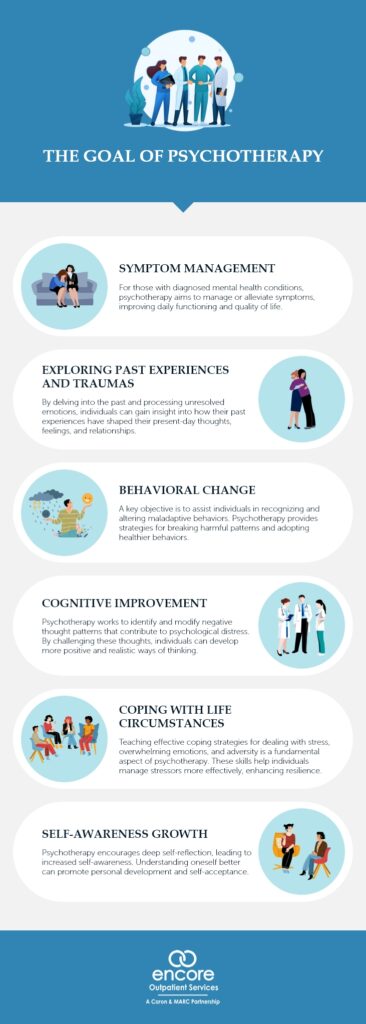Psychotherapy, a cornerstone of mental health treatment, aims to empower individuals to overcome emotional, behavioral, and psychological challenges. This blog post delves into the multifaceted goals of psychotherapy, exploring how it fosters emotional healing, promotes behavioral change, improves relationships, manages mental health symptoms, and supports personal growth. By examining psychotherapy’s various approaches and outcomes, you can gain insight into how this therapeutic process can facilitate profound and lasting improvements in your mental well-being. Whether you are considering psychotherapy for yourself or seeking to understand its benefits for your loved one, this post offers a comprehensive overview of psychotherapy’s objectives and the transformative potential it holds.
Understanding the Purpose of Psychotherapy
The purpose of psychotherapy is to assist individuals in understanding and resolving their mental health challenges through guided conversation and therapeutic techniques. Its primary goal is to improve the mental well-being of patients by helping them identify and change troubling emotions, thoughts, and behaviors. Psychotherapy provides a supportive environment where individuals can discuss their issues with confidentiality and without judgment.
This therapeutic process aims to equip people with strategies to manage distress, enhance their coping mechanisms, and improve their overall functioning in daily life. Whether addressing specific mental health conditions like anxiety or depression or navigating life transitions and interpersonal conflicts, psychotherapy seeks to foster personal growth and emotional healing.
By facilitating self-awareness and encouraging positive changes in thought and behavior patterns, psychotherapy supports individuals in developing a healthier relationship with themselves and others. Ultimately, the purpose of psychotherapy is to empower individuals to lead more fulfilling and balanced lives by overcoming the barriers of mental health disorders.

Core Goals of Psychotherapy
The core goals of psychotherapy revolve around improving the mental health and well-being of individuals by addressing and resolving underlying psychological distress. Some of the common goals include:
- Symptom Management – For those with diagnosed mental health conditions, psychotherapy aims to manage or alleviate symptoms, improving daily functioning and quality of life.
- Exploring Past Experiences and Traumas – By delving into the past and processing unresolved emotions, individuals can gain insight into how their past experiences have shaped their present-day thoughts, feelings, and relationships.
- Behavioral Change – A key objective is to assist individuals in recognizing and altering maladaptive behaviors. Psychotherapy provides strategies for breaking harmful patterns and adopting healthier behaviors.
- Cognitive Improvement – Psychotherapy works to identify and modify negative thought patterns that contribute to psychological distress. By challenging these thoughts, individuals can develop more positive and realistic ways of thinking.
- Improving Relationships and Social Skills – Another goal of psychotherapy is to improve communication skills and relationship dynamics. Psychotherapy can help individuals understand and improve their interactions with others, fostering healthier relationships.
- Coping with Life Circumstances – Teaching effective coping strategies for dealing with stress, overwhelming emotions, and adversity is a fundamental aspect of psychotherapy. These skills help individuals manage stressors more effectively, enhancing resilience.
- Self-awareness Growth – Psychotherapy encourages deep self-reflection, leading to increased self-awareness. Understanding oneself better can promote personal development and self-acceptance.
Achieving these goals can lead to significant improvements in an individual’s mental health, overall quality of life, and ability to navigate life’s challenges.
How Psychotherapy Achieves Its Goals
Psychotherapy achieves its goals through a combination of therapeutic techniques, a supportive therapist-patient relationship, and the active participation of the patient. The process is structured around several key elements:
- Therapeutic Alliance – The foundation of psychotherapy is the therapeutic alliance, a strong, trust-based relationship between the therapist and the patient. This relationship provides a safe and supportive environment for individuals to explore their thoughts, feelings, and behaviors.
- Communication and Insight – Through open dialogue, psychotherapy encourages individuals to articulate their experiences and emotions. This process fosters insight into their psychological patterns, contributing to self-awareness and understanding.
- Behavioral Techniques – Therapists employ various techniques, such as cognitive-behavioral strategies, to help patients identify and change maladaptive behaviors and thought patterns. These interventions are tailored to the individual’s needs and goals.
- Emotional Processing – Psychotherapy provides a space for individuals to process and work through emotions, including those that are deeply buried or have been avoided. Emotional processing is vital for healing from trauma and emotional distress.
- Skill Development – Individuals learn new skills, such as stress management, communication, and problem-solving techniques, which are essential for coping with daily life challenges and improving mental health.
- Setting Treatment Goals – Therapy involves setting specific, achievable goals. These goals guide the therapeutic process and provide a framework for measuring progress.
- Feedback and Adaptation – Psychotherapy is a dynamic process where feedback from the patient is used to adapt and refine the approach. This ensures that therapy remains responsive to the individual’s evolving needs.
By integrating these elements, psychotherapy effectively helps individuals achieve emotional healing, behavioral change, and improved mental health, leading to a higher quality of life.
Who Can Benefit From Psychotherapy?
Psychotherapy is a versatile treatment approach that can benefit a wide range of individuals facing various challenges. Those who can benefit include:
- Individuals with Mental Health Disorders – People experiencing mental health conditions such as depression, anxiety disorders, bipolar disorder, borderline personality disorder (BPD), schizophrenia, and substance use disorder can find relief and improvement through psychotherapy.
- People Undergoing Life Transitions – Major life changes, including divorce, the death of a loved one, career changes, or retirement, can be overwhelming. Psychotherapy offers support and strategies for navigating these transitions more effectively.
- Those Experiencing Relationship Issues – Individuals or couples facing communication problems, conflicts, or dissatisfaction in their relationships can gain insights and tools to improve their interactions and resolve conflicts.
- People with Chronic Illness or Pain – Individuals dealing with chronic physical conditions may experience emotional distress or mental health challenges. Psychotherapy can help manage the psychological impact of these conditions.
- Children and Adolescents – Young individuals experiencing behavioral issues, academic concerns, bullying, or emotional difficulties can benefit from psychotherapy tailored to their developmental stage.
- Victims of Trauma or Abuse – Those who have experienced traumatic events or abuse can find psychotherapy a vital space for healing and recovery.
- Individuals Seeking Personal Growth – Individuals interested in self-improvement, seeking a deeper understanding of themselves, or wishing to develop better coping strategies for stress and life’s challenges can find psychotherapy beneficial.
Psychotherapy is suitable for anyone seeking to improve their mental health, navigate life’s challenges more effectively, or simply pursue personal growth and well-being.
Types of Psychotherapy
There are various types of psychotherapy, each rooted in distinct theoretical frameworks and methods. Here are some of the common types:
- Cognitive Behavioral Therapy (CBT) – This evidence-based therapy focuses on identifying and changing negative thought patterns and behaviors.
- Psychodynamic Therapy – Rooted in psychoanalytic principles, this therapy explores how past experiences, especially from childhood, shape current thoughts, emotions, and behaviors.
- Interpersonal Therapy (IPT) – IPT targets interpersonal issues and relationship problems, aiming to enhance communication skills, resolve conflicts, and improve social support.
- Family Therapy – This involves working with families or couples to address relational dynamics, communication patterns, and conflicts to improve family functioning and promote understanding and support among family members.
- Mindfulness-Based Therapies – This psychotherapy incorporates mindfulness practices to promote present-moment awareness, acceptance, and emotional regulation.
- Yoga and Movement Therapies – This approach integrates physical postures, breathing techniques, and sometimes meditation to promote holistic well-being.
- Trauma-Focused Therapies – Therapies such as eye movement desensitization and reprocessing (EMDR) and trauma-focused cognitive behavioral therapy (TF-CBT) address the psychological effects of trauma to help individuals regain a sense of safety and control.
- Art Therapy – This type of therapy involves the use of creative techniques, such as drawing, painting, or sculpting, to help individuals express their feelings and emotions.
- Psychodrama Therapy -This form of psychotherapy utilizes drama and theater techniques to help individuals resolve conflicts, express emotions, and improve relationships.
- Psychodrama Therapy -This form of psychotherapy utilizes drama and theater techniques to help individuals resolve conflicts, express emotions, and improve relationships.
- Nature-Based Therapy – This approach leverages the natural environment to improve mental and physical health.
The choice of psychotherapy depends on factors such as the individual’s specific concerns, the severity of their condition, and their preferences regarding the intervention style. It’s essential to consult with a qualified mental health professional to determine the appropriate course of treatment.
If you or a loved one is navigating the complexities of substance use disorder or mental health challenges, Encore Outpatient Services is here to support your journey toward recovery. Our comprehensive suite of treatment options, tailored to meet the diverse needs of adults, ensures that each individual receives the care and support necessary for a sustainable recovery. With our integrated approach to treatment, we facilitate seamless transitions between different levels of care, guided by a dedicated team of medical providers. Take the first step towards a healthier and more productive life by reaching out to Encore Outpatient Services.
